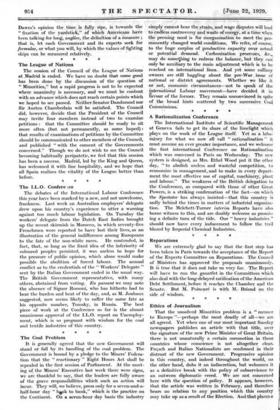The Coal Problem It is generally agreed that the new
Government will stand or fall by its handling of the coal problem. The Government is bound by a pledge to the Miners' Federa- tion that the " reactionary " Eight Hours Act shall be repealed in the first session of Parliament. At the meet- ing of the Miners' Executive last week there were signs, we are thankful to say, that the leaders are fully aware of the grave responsibilities which such an action will incur. They will, we believe, press only for a seven-and-a- half-hour day " blyik to bank," which is the practice on the Continent. On a seven-hour day basis- the industry simply cannot bear the strain, and wage disputes will lead to endless controversy and waste of energy, at a time when the pressing need is for reorganization to meet the per- manently changed world conditions. We refer, of course, to the huge surplus of productive capacity over actual or potential demand. Carbonization processes, &c.1 may do something to redress the balance, bid they, can be auxiliary to the main adjustment which is to he- reached on international lines. _ And yet some colliery, owners are still haggling about the pre-War - issue of national or district agreements. Whether we like it or not, economic circumitances—not to speak of the international Labour movement—have decided it in favour of the former. They remain unconvinced in spite of the broad hints scattered' by two successive Coal CoMmiasionS; * * *












































 Previous page
Previous page